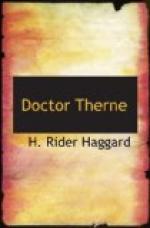In another week the writ had been issued, and we were in the thick of the fight. What a fight it was! Memory could not record; tradition did not even record another half as fierce in the borough of Dunchester. For the most part, that is in many of our constituencies, it is not difficult for a candidate standing in the Radical interest, if he is able, well-backed, and not too particular as to what he promises, to win the seat for his party. But Dunchester was something of an exception. In a sense it was corrupt, that is, it had always been represented by a rich man, who was expected to pay liberally for the honour of its confidence. Pay he did, indeed, in large and numberless subscriptions, in the endowment of reading-rooms, in presents of public parks, and I know not what besides.
At least it is a fact that almost every advantage of this nature enjoyed to-day by the inhabitants of Dunchester, has been provided for them by former Conservative members for the borough.
Under these circumstances it is not to be wondered at that in choosing a candidate the majority of the electors of the city were apt to ask two leading questions: first, Is he rich? and secondly, What will he do for the town if he gets in?
Now, Sir Thomas Colford was very rich, and it was whispered that if he were elected he would be prepared to show his gratitude in a substantial fashion. A new wing to the hospital was wanted; this it was said would be erected and endowed; also forty acres of valuable land belonging to him ran into the park, and he had been heard to say that these forty acres were really much more important to the public than to himself, and that he hoped that one day they would belong to it.
It is small wonder, then, that the announcement of his candidature was received with passionate enthusiasm. Mine, on the contrary, evoked a chorus of disapproval, that is, in the local press. I was denounced as an adventurer, as a man who had stood a criminal trial for wicked negligence, and escaped the jail only by the skin of my teeth. I was held up to public reprobation as a Socialist, who, having nothing myself, wished to prey upon the goods of others, and as an anti-vaccination quack who, to gain a few votes, was ready to infest the whole community with a loathsome disease. Of all the accusations of my opponents this was the only one that stung me, because it alone had truth in it.
Sir John Bell, my old enemy, one of the nominators of Sir Thomas Colford, appeared upon the platform at his first meeting, and, speaking in the character of an old and leading citizen of the town, and as one who had doctored most of them, implored his audience not to trust their political fortunes to such a person as myself, whose doctrines were repudiated by almost every member of the profession, which I disgraced. This appeal carried much weight with it.




